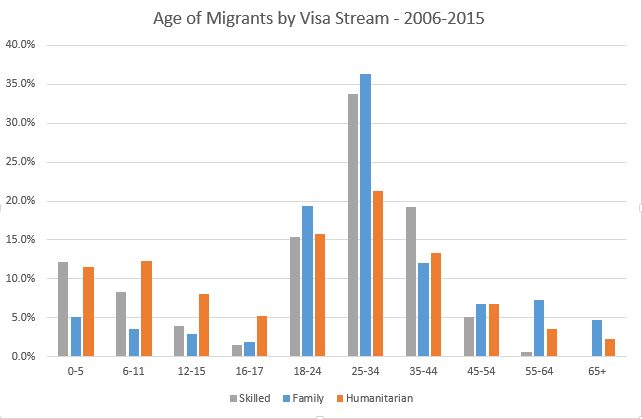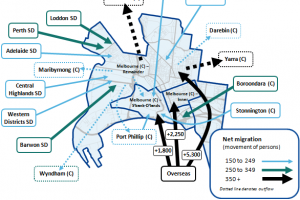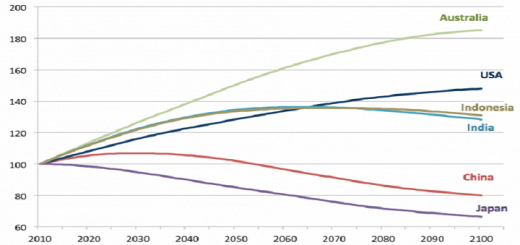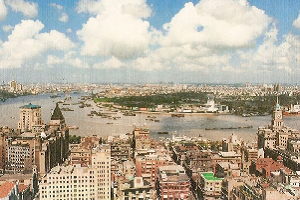How many refugees does Australia take?
With the current crisis around Syrian refugees, Australia is under pressure to “do more” with this global issue. We thought we’d provide some context by analysing what Australia does already, and where our refugee intake comes from.
How many refugees does Australia take?
Australia in calendar year 2014 provided a home and new start in life to 11,970 humanitarian arrivals (refugees).
This represented just under 8% of the total permanent migration into Australia for the financial year, with most of the migrants coming from the other streams such as skilled and family reunion migration. A substantial number also had the stream of migration not recorded. This percentage hovers around 8-10% of total migration most years.
So refugees made up about 10% of migration, and about 3.6% of Australia’s total population growth for the calendar year 2014. Put another way, Australia’s population in 2014 grew by 1.4% of existing population – refugees made up only 0.05% of this. Refugees barely make an impact on Australia’s population numbers.
Which countries do refugees who settle in Australia come from?
The next table shows the top humanitarian arrival countries for the calendar year 2014.
Syria, the source of the largest number of refugees in the current wave of migration into Europe, was the third largest intake in 2014, after Iraq and Afghanistan – countries torn by war who have been a large part of our refugee intake for many years.
At the 2011 Census, Australia was home to only 8,319 people born in Syria, so this one year intake would have increased our population of people from Syria by nearly a quarter. We can expect this population group to at least double by the next Census and possibly more if we increase our intake. The latest announcement by the government is that we will increase our intake from Syria but not the total humanitarian intake – this means that numbers from other countries in need like Iraq would be reduced to compensate for this.
| Humanitarian arrivals in 2014 | Number | % of total humanitarian arrivals |
| Iraq | 2,403 | 20.1% |
| Afghanistan | 1,889 | 15.8% |
| Syria | 1,837 | 15.4% |
| Burma | 1,293 | 10.8% |
| Iran | 770 | 6.4% |
| Thailand | 434 | 3.6% |
| Pakistan | 385 | 3.2% |
| Bhutan | 315 | 2.6% |
| Eritrea | 280 | 2.3% |
| Nepal | 224 | 1.9% |
| DR Congo | 217 | 1.8% |
| Others | 1,923 | 16.0% |
| Source: Department of Immigration, Settlement Reporting System | ||
Another note about this table – it’s by country of BIRTH – places like Thailand and Nepal don’t generate very many refugees themselves – they mainly represent children who were born in refugee camps in those countries, to families originally from Burma and Bhutan respectively.
Where in Australia do refugees settle?
Many of these migrants have been resettled to regional areas, which struggle to attract new people to their areas, where they have filled labour shortages resulted from declining, ageing populations. A good example is the resettlement of several hundred Karen (Burmese) refugees in Nhill in Hindmarsh Shire, western Victoria. These refugees have become an important part of the local community.
This table shows the areas which, in the last 4 years since the 2011 Census, have added the largest share of their migration from the humanitarian stream. The largest numbers are in culturally diverse metropolitan areas, but the presence of regional areas on the list is quite strong as they get relatively few migrants in the skilled or family streams, so when they accept refugees this makes up a larger share of their total migration.
| Arrivals since Census 2011 (to May 2015) ranked by % of all arrivals who are in the humanitarian stream | ||
| LGA | Humanitarian | % Humanitarian |
| Glenorchy Tas | 669 | 71.7% |
| Launceston Tas | 728 | 55.8% |
| Mount Gambier SA | 187 | 55.2% |
| Fairfield NSW | 4,873 | 52.0% |
| Playford SA | 665 | 47.5% |
| Plantagenet WA | 33 | 46.5% |
| Tatiara SA | 71 | 45.8% |
| Coffs Harbour NSW | 552 | 45.5% |
| Naracoorte and Lucindale SA | 91 | 41.7% |
| Maroondah Vic | 1,140 | 41.6% |
| Katanning WA | 44 | 41.1% |
| Grant SA | 9 | 40.9% |
| Hume Vic | 2,754 | 40.4% |
| Mildura Vic | 267 | 39.3% |
| Leeton NSW | 35 | 35.4% |
| Logan Qld | 1,786 | 34.1% |
| Liverpool NSW | 2,186 | 33.7% |
| Clarence NSW | 110 | 31.5% |
| Salisbury SA | 1,461 | 30.6% |
| Toowoomba Qld | 689 | 29.3% |
| Greater Shepparton Vic | 401 | 28.2% |
| Wollongong NSW | 923 | 27.8% |
| Greater Bendigo Vic | 252 | 27.4% |
| Renmark Paringa SA | 26 | 26.8% |
What is the effect of refugees on the economy?
Historically, refugees have provided an important part of Australian migration, and there is a strong tradition of our country opening its borders to those in need – for instance, Vietnamese in the 1970s, who are such an important part of the fabric of Australia’s society and economy now it’s hard to imagine what life would be like without them! Refugees may need support for the first few years, but those starting a new life are often driven and loyal to their new country, typically work hard and contribute a lot to the economy in future years. An ABS publication released just last week on income levels of migrants shows that refugees are more likely than any other migrant category to start their own business. So accepting refugees is a great way to grow the economy long term as well. And of course they provide a cushion against the ageing population, invigorating the population with a generally young workforce with many years of working life ahead of them. Refugees are naturally more spread out in ages than the skilled migrants, but there are many children in this group, and still a larger proportion in their 20s and 30s than is present in the total population.
Source: Department of Immigration, Settlement Reporting System
It’s clear from this data that, while Australia does take a significant number of refugees already, even increasing the intake from Syria to 20,000 people, while not reducing the intake from other countries, would increase Australia’s population by less than 0.1%. It would create a strong new multicultural community in Australia and potentially bolster the economy in years to come.









See also this excellent blog post from Julian Burnside QC which sets out the number of assessed refugees actually living in Australia at the present time. http://www.julianburnside.com.au/refugee-resettlement-getting-the-facts-straight/
Hi Glenn,
Just wondering how many refugees came from South/Sudan in 2014 on Humanitarian visas?
Is a Humanitarian visa for Refugees?
Thanks,
Judith.
According to the current Department of Immigration and Border Protection numbers, there were 128 refugees from Sudan and 115 from South Sudan in 2014. A total of 294 and 261 people from these countries respectively settled in Australia. More than half of these two countries arrivals come under the family stream now, which is common where there is already a large population from that origin country in Australia.
I have used Humanitarian visa as a synonym for Refugees – it also includes processed asylum seekers whose refugee status has been confirmed. I’m not a legal expert however, and suggest you check out the blog in my comment above for more info about the different categories of refugee arrivals.
Hi Glen – Thanks for this article – obviously very topical and timely. One thing I don’t understand though is the table “Arrivals since Census 2011 (to May 2015) ranked by % of all arrivals who are in the humanitarian stream” Can you explain what the percentages mean another way to help me out?
These places don’t necessarily take the most refugees in absolute number (though a few in the list are among the largest), but they are the places where, of all migration, the humanitarian component makes up the largest share. This tends to highlight smaller places which are nevertheless giving a home to refugees, where they don’t get a lot of other migration.
Hi Glenn, great resource, thanks. Can you point me in the direction of a reliable global forecast regarding the trend of increasing numbers of refugees.
Great to hear that the government has decided to take in 12,000 Syrian refugees in ADDITION to our regular intake. This blog was written before this announcement, but the assumptions in it remain valid. They will make a negligible increase in the total population growth but potentially have a strong impact on economic growth in the years to come.
I was of the understanding that the Federal Government commitment to take 12,000 Syrian refugees was additional to the existing humanitarian intake commitment of just over 13,000 people. Please clarify?
Thank you Erich
Hi Erich – this article was written before that announcement. Yes, the 12,000 is in addition. I added a comment, above, on September 10th, to that effect.
Who decides where the refugees go. Do councils place an “expression of interest” – for want of a better term . Or does the the state government approach the council.
Really stimulating article.
That’s a really good question and I’m not sure if there is a place where regions can nominate themselves as candidates to receive refugees in their community. Certainly when you look at the figures there are many smaller places which would otherwise not be considered migrant destinations who have clearly put themselves forward and taken in settlers. But I don’t know if there is a formal process. Perhaps another reader can shed light on it?
Hi Glenn,
I was wondering if you could please provide me with some statistics on how many Burmese refugees from Chin state Australia accepts every year and if these numbers are expected to decline now that Myanmar is (hopefully) entering a more democratic era?
Hey Glenn,
I was wondering hoe many refugees, including those that came via boat etc currently live in Australia? I’ve been having trouble finding the correct number that includes those that came without a visa or passport but by a boat.
Cheers,
Kirk.
Do you have any idea what percentage of the current Australian population are descended from refugees? (I am.)
It’s probably a slippery figure to put a finger on. May depend on your definition of refugee – going back over time there are probably less robust definitions of what constitutes an actual refugee. But certainly everyone in this country who is not of Indigenous background has migrant ancestors within the relatively recent past, and many of those would potentially be considered refugees these days, so I suspect it would be upwards of 50% depending on your definition!
Hi Glenn do you know what the current Australian Policy for refugees are
Thanks,
Christian
i live in playford south australia and have noticed all of a sudden a large number of muslim and african people in Elizabeth where have they come from ?? as they seemed to appear all of a sudden within the last 6 months !!
there seem to be several people from muslim countries and african countries placed into the playford district over the last few months with no information given to the community as far as i know.Why is the community not made aware of this and can you infom me who is responsible for informing the public on this ??
Greeting Glenn,
I’m a student doing an assignment about the negatives of refugees. Now I’m not racist but I would like an unbiased opinion according to evidence. I ask this because any research I do is always painting the picture that refugees are only a benefit. What are some negatives of refugees in Australia?
Hi Michael,
I think in the long term it’s mainly a positive. Negative implications in the short term could include that as a nation we may be taking in people who need a lot of support to rebuild their lives, and may not be productive members of society for a while. This is an economic cost – but once refugees are fully integrated into Australian society I think they are likely to be an economic bonus for Australia.
The qualifications of refugee status is so lax these days and the entire concept outside of specific political targets is meaningless. There will always billions of others living in as bad if not worse poverty and conflict throughout the 3rd world.
The western world need to stop fetishising these refugees for kudos and put all that effort towards incentives not arms conflict resolution and nation building. Australia s beginning to show the cracks and many in Europe are in a far worse way and will collapse within a decade or two.
Hi Glenn.
My name is Wendy.
Is there a way to find out how many Karen Speaking people are in WA and roughly what areas they live in?
Thank you
Hi Wendy,
If you jump on to any of our Western Australian community profiles (eg. http://profile.id.com.au/joondalup) you’ll find they have a Data Exporter section, where you can export benchmark level data, for the area, its suburbs, and wider region and state. You can get the state figure for Karen speakers by using the “Language spoken at home” option. To get a geographic breakdown on this you’d need to use the ABS Tablebuilder service, or .id’s placemaker. Or you can look at each LGA’s profile.id site individually. Most of the Karen speakers in WA are located in the northern suburbs, particularly Stirling (who don’t subscribe to profile.id), Joondalup and Wanneroo.
Hi Glenn
Is there a way to find out how many Karen speaking people live in WA and roughly what area they are in.
Thank you!
Wendy
Hi Glen,
I would be interested in the break-up of the latest statistics of African Ethnic groups (Somalian, Ethiopian, etc. that are currently in Australia (states @ 2019) and how many siblings have been born from the parents since their arrivals.
Much appreciated,
Len